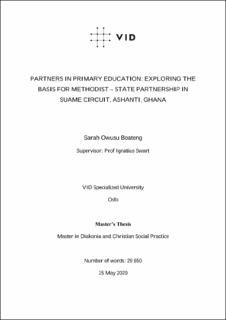Partners in primary education: Exploring the basis for methodist – State partnership in Suame Circut, Ashanti, Ghana
Master thesis
Permanent lenke
https://hdl.handle.net/11250/2825414Utgivelsesdato
2020Metadata
Vis full innførselSamlinger
Sammendrag
The aim of this research was to show how education has been very essential to the development of Ghana. It also endeavoured to investigate how successful the government and the various kinds of churches could bridge their differences for a complete education to all children in the Suame Circuit and Ghana as a whole. The research question for this study was: As providers of the primary education, what are the grounds or the basis for the partnership of the Methodist mission schools and the State? The research strategy entailed a qualitative method with a case study design because the researcher was interested in obtaining in-depth information of the case and to development an understanding of the people towards the case at hand. Interview and document analysis were used for collecting data with a non-probability purposive sampling. Descriptive analysis was used in this research. The study employed two theories: Theory of development through partnership and also theory of diakonia empowerment and transformation. The study was based on how the Methodist schools went into difficulties and later sought for assistance from the state to help running their schools. This eventually caused them to enter into partnership with the state and this helped to empower and transform them. Though they encountered many challenges the partnership turned out to be successful in building primary education in the circuit. The findings revealed that in spite of all the challenges that the Methodist schools faced, their problems were solve and eventually they were empowered and transformed.
